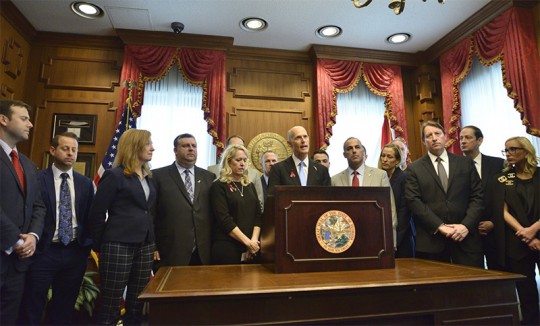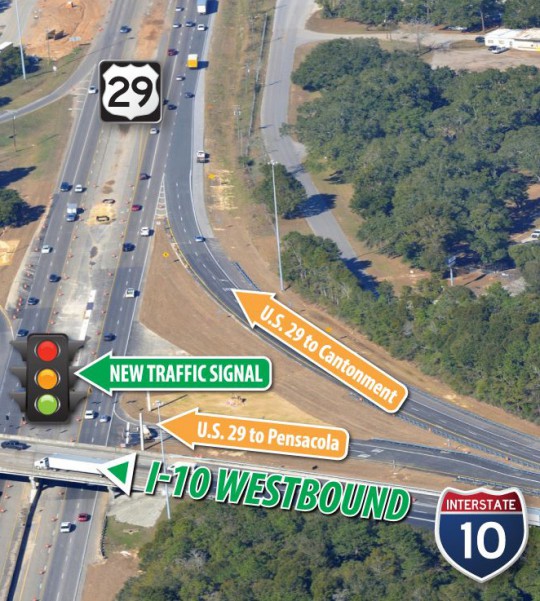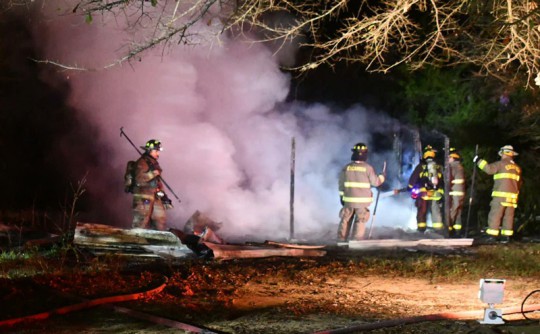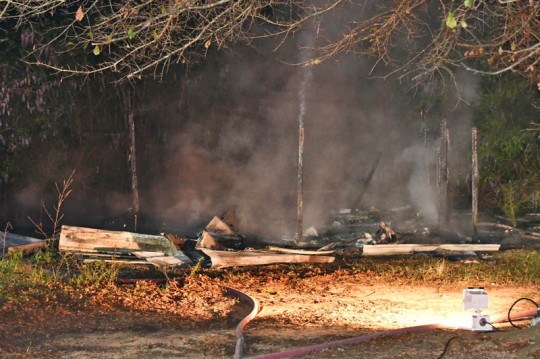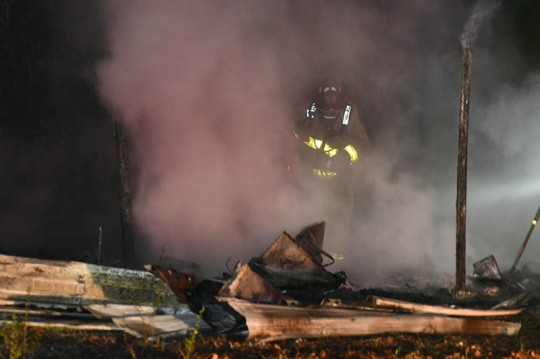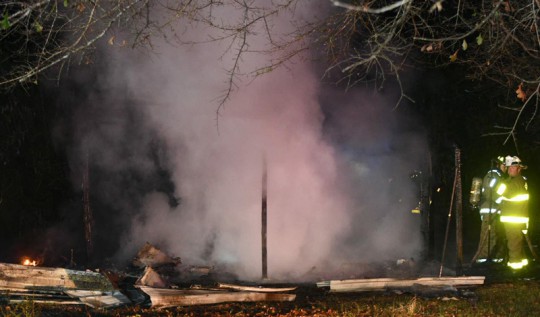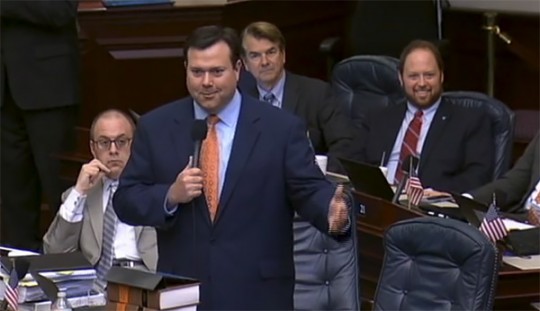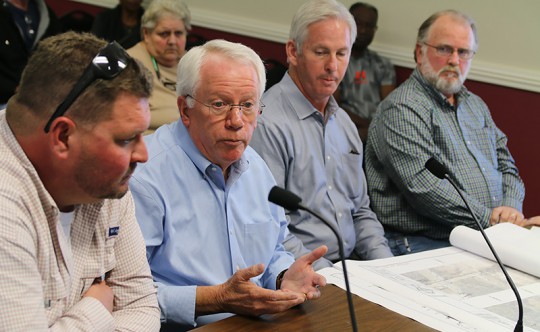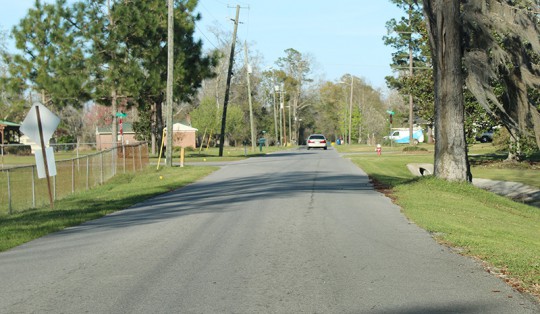Scott Signs School Safety Bill; NRA Launches Challenge
March 10, 2018
Flanked by the parents of Broward County teenagers slain in the nation’s second-worst school shooting, Gov. Rick Scott on Friday signed into law a sweeping package addressing mental health, school safety and guns.
Immediately, the National Rifle Association filed a lawsuit in federal court to challenge the new law, which raises the age from 18 to 21 and imposes a three-day waiting period for the purchase of rifles and other long guns. The age and waiting-period requirements already apply to buying handguns, but the NRA contends that the new restrictions on rifles are unconstitutional.
Scott’s signature came after weeks of intensely emotional advocacy by students, educators and families of the 17 people shot dead by 19-year-old gunman Nikolas Cruz at Marjory Stoneman Douglas High School in Parkland.
The parents accompanying Scott on Friday praised the governor and lawmakers for the unprecedented speed in passing the legislation, just three weeks after the Feb. 14 massacre.
“To everyone that’s watching out there, I wish I could tell you that I’m happy. But how could we be happy? He buried his sister, and I buried my daughter. To me, this is a start for us,” Andrew Pollack, accompanied by his son Hunter, told reporters after Scott signed the school-safety package (SB 7026).
Pollack, whose 18-year-old daughter, Meadow, was among the 14 students killed, said he and other parents plan “on moving forward and hitting every other state to make sure they follow the lead of Florida.”
Speaking on behalf of the 17 families, Tony Montalto, whose 14-year-old daughter, Gina, was killed, called the new law the “beginning of the journey” to prevent “future acts of horrific school violence.”
“We have paid a terrible price for this progress. We call on more states, to follow Florida’s lead, and create meaningful legislation to make all schools safer. This time must be different,” he said.
Scott said the measure addressed all of the issues highlighted by the tragedy.
“Will this bill make a huge investment and dramatically improve school safety, in the hopes of never seeing another tragedy like this again? Will this bill provide more funding to treat the mentally ill? Will this bill give far more tools to keep guns away from people who should not have them? The answer to all three is yes. That is why I am signing the legislation today,” Scott, said, as media from across the nation, crammed into the governor’s office, looked on.
The $400 million package kindled political and ideological divisions for lawmakers already on edge after the heart-wrenching testimony from the shooting survivors and parents of the 14 slain students and three faculty members. The gun-related provisions in the legislation — or those left out — overshadowed other elements of the bill.
Democrats were split on what many considered a “poison pill” that allows specially trained teachers and other school personnel, deputized by sheriffs, to bring guns to school. School boards and sheriffs would have to agree to implement the program for it to go into effect. Teachers who work “exclusively” in the classroom would be excluded from the program, but those who have additional duties, such as drama coaches, would be eligible.
For some, the legislation marked an important first step toward stricter gun regulations and a vital response to the Parkland community’s demand for action.
But for others, the “school guardian” program was a deal-breaker.
Calling the program “scary,” black legislators objected that it would endanger minority children who are more likely to be punished at school. And the state teachers’ union asked Scott for a veto, saying the proposal allowing more than 200,000 school personnel to qualify to bring guns on campus would “do more harm than good.”
“We had to make a choice. Compromise is messy, especially when both chambers are controlled by Republicans,” Rep. Jared Moskowitz, a Coral Springs Democrat who graduated from the Parkland high school and who was present for the bill signing, told The News Service of Florida.
In addition to the new restrictions on purchasing rifles and other long guns, the new law also bans the sale or possession of “bump stocks,” which allow semi-automatic rifles to mimic fully automatic weapons. And it gives law enforcement officials the ability to seek court orders to seize weapons from people who pose a danger to themselves or others.
“So, in the totality of things, the guardian program is optional. I am hoping a lot of counties don’t opt in, and I am hoping a lot of teachers also don’t opt in. At the end of the day, we’ll be left with a really good gun-control, gun-reform bill in the state of Florida,” Moskowitz said.
But many frustrated Democrats also rejected the proposal because it failed to include a ban on assault–style weapons, such as the AR-15 semiautomatic rifle Cruz used to mow down students and teachers at the school he once attended.
On the other side of the aisle, the new regulations on purchasing firearms — the first gun restrictions approved by the Republican-controlled Legislature in nearly two decades — divided the GOP caucus. The NRA’s Florida lobbyist Marion Hammer, a former national president of the gun-rights group, branded those who voted for the proposal as “turncoat Republicans” who “caved to bullying and coercion.”
“(Scott) put his hand on a bible and took an oath to support, protect and defend the Constitution,” Hammer said in a telephone interview Friday. “So Gov. Scott obviously has a hard time keeping his word.”
The federal challenge accuses the state of “violating the constitutional rights of young adults between the ages of 18 and 21 years,” Hammer said.
After the legislation was proposed, Scott repeatedly objected to the three-day waiting period and allowing teachers to be armed.
But the governor said Friday he and others had to compromise, acknowledging that the gun regulations went too far for some and not far enough for others. He said
“I know the debate on all these issues will continue, and that’s healthy in our democracy. People are passionate in their beliefs and they should be. But, we should not insult or disparage each other. We should work together to make our schools safe for our kids. We have a lot of work ahead of us in order to enact these reforms and make our schools safer. This is a time for all of us to come together, roll up our sleeves, and get it done,” he said.
by Dara Kam, The News Service of Florida
Tate Lady Aggies, Northview Chiefs Earn Strong Wins (With Gallery)
March 10, 2018
Tate 14, Escambia 4
 The Tate Lady Aggies beat the Escambia Lady Gators Friday night, 14-4.
The Tate Lady Aggies beat the Escambia Lady Gators Friday night, 14-4.
For a photo gallery, click here.
Hannah Brown earned the win for the Aggies in six innings. She allowed four runs, four hits and recorded four strikeouts. Brown was 1-3 with two RBIs at the plate.
Also for the Aggies: Belle Wolfenden 1-4; Shelby Ullrich 2-3, 2B, 2R, RBI; Bailyn Murdey 2-3, 3R, 2RBI; Kyndal Bray R; Ryleigh Cawby 3-3, 2B, 3R, 2RBI; Katie Synder R; Shelby McLean 2-4, RBI; Gabby Locke R.
Tate 14, Escambia 0 (JV)
The wining pitcher for the Tate Aggies JV was Abbie Burks.
Northview 5, Freeport 1 (Thursday night)
Tori Herrington had 10 stikeouts while batting 2-4 as the Northview Lady Chiefs beat Freeport 5-1 Thursday night.
Kendall Engfinger RBI; Aubree Love 3-4, RBI; Valen Shelley 2-3; Heather Knowles 2-4, RBI; Rylee Huskey RBI; Sullivan RBI.
NorthEscambia.com photos by Jared Sigler, click to enlarge.
New I-10 To Highway 29 Exit Ramp To Open, New Traffic Signal
March 10, 2018
A new I-10 exit ramp onto Highway 29 is opening this weekend, and a new traffic signal will be activated.
I-10 westbound drivers destined for Highway 29 North (Cantonment exit) Highway 29 south (Pensacola exit) will begin using the new Exit 10 on Sunday A new Highway 29 traffic signal, located at the bottom of the exit ramp, will manage traffic exiting I-10 in addition to Highway 29 north and southbound traffic.
There will be alternating lane closures on I-10, Highway 29 and associated ramps from 8 p.m. Sunday to 6 a.m. as crews prepare the exit ramp for traffic.
The current I-10 Exit 10A, will be permanently closed.
All activities are weather dependent and may be delayed or re-scheduled in the event of inclement weather.
Northview Beats Snook Christian
March 10, 2018
The Northview Chiefs swept a doubleheader against Snook Christian Academy of Foley Friday in Bratt.
 Northview run-ruled both games, taking the second 16-0.
Northview run-ruled both games, taking the second 16-0.
The Chiefs were coming off a 10-3 win district win over Baker on Tuesday.
The Northview Chiefs will host East Webster, MS, on Saturday — junior varsity at 1:00, varsity at 3:30.
NorthEscambia.com photos, click to enlarge.
Tate Aggies Fall To The Pine Forest Eagles
March 10, 2018
 The Tate High School Aggies lost to Pine Forest Friday night, 6-5.
The Tate High School Aggies lost to Pine Forest Friday night, 6-5.
The Aggies were coming off a District 1-7A win over Pine Forest Thursday night.
NorthEscambia.com photos by Jared Sigler for NorthEscambia.com click to enlarge.
Student Arrested For Making Statements About Taking A Gun To School
March 10, 2018
A Bellview Middle School student was arrested Friday for allegedly making statements about bringing a gun to school and harming classmates.
 Dakota Hamrac, 12, was charged with a felony for a false report concerning the use of a bomb, an explosive, or a weapon of mass destruction, or concerning the use of firearms in a violent manner.
Dakota Hamrac, 12, was charged with a felony for a false report concerning the use of a bomb, an explosive, or a weapon of mass destruction, or concerning the use of firearms in a violent manner.
The Escambia County Sheriff’s Office said his belongings were thoroughly searched and no weapons were found.
Florida Gov’t Weekly Roundup: ‘Job One’
March 10, 2018
Big picture, a lot of things happen during legislative sessions that really aren’t important.
Special interests battle among themselves. Lawmakers give ponderous speeches. Press conferences come and go.
But this week, lawmakers dealt with perhaps the most-important issue they will face during their time in Tallahassee.
 After the devastation of the mass shooting at Marjory Stoneman Douglas High School, lawmakers spent days debating and ultimately passing a bill to try to improve school safety, boost mental-health services and impose new gun restrictions.
After the devastation of the mass shooting at Marjory Stoneman Douglas High School, lawmakers spent days debating and ultimately passing a bill to try to improve school safety, boost mental-health services and impose new gun restrictions.
The debate, at times, was gut-wrenching. It also went beyond the Parkland shooting and reflected racial and cultural divides.
But the families of the 17 people killed at Marjory Stoneman Douglas High offered support for the bill and helped prompt Gov. Rick Scott to sign it. They knew something needed to be done.
Will the bill work? Will parents be able to drop their kids off at school in the morning and be assured they will be safe?
The truth is, nobody knows for sure.
But amid all the messiness and political maneuvering of the final week of the legislative session, it was a big deal.
‘PUSH THE GREEN BUTTON’
Rep. Jared Moskowitz, D-Coral Springs, went to Marjory Stoneman Douglas High. He served on the Parkland City Commission. And after word came Feb. 14 of the massacre, he rushed home to Broward County.
So when Moskowitz took the microphone on the House floor Wednesday, the usual clamor in the chamber stopped and members listened. Moskowitz’s described the awful scene at the school after the shooting. Then he broke down while describing how his 4-year-old son was receiving writing lessons from a pre-school teacher when the teacher’s daughter was shot dead at the school.
Moskowitz chided House members who throughout the day called the vote on the bill a difficult decision.
“This isn’t hard. Putting your kid in the ground is hard. This is a button. … Push the green button,” Moskowitz concluded, referring to the button for “yes” votes.
The $400 million package includes $69 million for early mental health screening and services, $97 million for school resource officers, $98 million for school-hardening grants, and $25 million to raze and rebuild the freshman building where the shooting spree occurred.
But the debate focused mostly on gun issues. The National Rifle Association and its allies tried to rally opposition because of part of the bill that increased the minimum age to 21 and imposed a three-day waiting period for people purchasing rifles and other long guns.
As more evidence of the opposition, the NRA quickly filed a federal lawsuit challenging the restrictions after Scott signed the bill Friday.
“(Scott) put his hand on a bible and took an oath to support, protect and defend the Constitution,” NRA lobbyist Marion Hammer said in a telephone interview Friday with The News Service of Florida. “So Gov. Scott obviously has a hard time keeping his word.”
Scott, had objected to the three-day waiting period but said Friday he and others had to compromise, acknowledging that gun regulations in the bill went too far for some and not far enough for others.
“I know the debate on all these issues will continue, and that’s healthy in our democracy. People are passionate in their beliefs and they should be. But, we should not insult or disparage each other. We should work together to make our schools safe for our kids. We have a lot of work ahead of us in order to enact these reforms and make our schools safer. This is a time for all of us to come together, roll up our sleeves, and get it done,” he said.
The other major gun issue focused on part of the bill that would allow trained school employees, including some teachers, to be armed. The so-called school “guardian” program drew objections from many people who don’t want guns added to the daily mix in schools.
But the proposal also sparked debate with a decidedly racial aspect. Black lawmakers fear the program could endanger minority students, who are more likely to be punished at school. The lawmakers said they worry minority students could be unfairly targeted in emergencies, as could armed school personnel who are “black or brown.”
“I’m afraid that in an emergency situation, a black or brown student who may be running down the hall to get away like everyone else, who reaches for his or her cell phone to call their parent, may be seen not as a student, but as a shooter,” Rep. Cynthia Stafford, a Miami Democrat who is black, said.
But Rep. Elizabeth Porter, a Lake City Republican who supported the program, pushed back against such arguments.
“All of a sudden, the folks that have been proponents of teachers all these years are now saying that teachers are incompetent to have a concealed weapon permit, they’re racist, they’re bigoted, they’re going to target black boys and brown boys. I don’t think that of our teachers at all. I don’t believe that of them,” Porter said.
THE END GAME
Lawmakers should have been celebrating Friday night and getting ready to head home. But instead, they faced the prospect of spending Sunday afternoon in the Capitol to pass a budget and a tax-cut package.
House and Senate leaders extended the 60-day session after negotiators could not finalize a budget in time to end the session on time Friday.
The $400 million package for school safety after the Broward County shooting caused unexpected budget changes late in the session. Senate Appropriations Chairman Rob Bradley, R-Fleming Island, said the shooting had “a real impact” on the budget process.
“We responded aggressively,” Bradley said. “If we don’t protect our kids, what are we here for? That’s job one.”
But the negotiations got hung up on other, more-typical issues, such as Medicaid funding for hospitals and nursing homes.
In the end, the Senate got one of its priorities, with an increase in Medicaid funding for nursing homes. Meanwhile, the House got part of what it wanted by continuing to funnel extra money to hospitals that serve large numbers of Medicaid patients.
When they return to the Capitol on Sunday, lawmakers will approve an $88.7 billion budget for the fiscal year that starts July 1.
STORY OF THE WEEK: The House and Senate passed a wide-ranging plan designed to improve school safety after the Feb. 14 mass shooting at Marjory Stoneman Douglas High School in Broward County. Gov. Rick Scott signed the bill Friday, and it quickly drew a legal challenge from the National Rifle Association.
QUOTE OF THE WEEK: “My precious daughter Meadow’s life was taken, and there’s nothing I can do to change that. But make no mistake, I’m a father and I’m on a mission. I’m on a mission to ensure that I’m the last dad to ever read a statement of this kind.” — Andrew Pollack, reading a statement after the House passed the school-safety package Wednesday. Pollack’s 18-year-old daughter, Meadow, was among the 14 students slain at Marjory Stoneman Douglas High School last month.
Big picture, a lot of things happen during legislative sessions that really aren’t important.
Special interests battle among themselves. Lawmakers give ponderous speeches. Press conferences come and go.
But this week, lawmakers dealt with perhaps the most-important issue they will face during their time in Tallahassee.
After the devastation of the mass shooting at Marjory Stoneman Douglas High School, lawmakers spent days debating and ultimately passing a bill to try to improve school safety, boost mental-health services and impose new gun restrictions.
The debate, at times, was gut-wrenching. It also went beyond the Parkland shooting and reflected racial and cultural divides.
But the families of the 17 people killed at Marjory Stoneman Douglas High offered support for the bill and helped prompt Gov. Rick Scott to sign it. They knew something needed to be done.
Will the bill work? Will parents be able to drop their kids off at school in the morning and be assured they will be safe?
The truth is, nobody knows for sure.
But amid all the messiness and political maneuvering of the final week of the legislative session, it was a big deal.
‘PUSH THE GREEN BUTTON’
Rep. Jared Moskowitz, D-Coral Springs, went to Marjory Stoneman Douglas High. He served on the Parkland City Commission. And after word came Feb. 14 of the massacre, he rushed home to Broward County.
So when Moskowitz took the microphone on the House floor Wednesday, the usual clamor in the chamber stopped and members listened. Moskowitz’s described the awful scene at the school after the shooting. Then he broke down while describing how his 4-year-old son was receiving writing lessons from a pre-school teacher when the teacher’s daughter was shot dead at the school.
Moskowitz chided House members who throughout the day called the vote on the bill a difficult decision.
“This isn’t hard. Putting your kid in the ground is hard. This is a button. … Push the green button,” Moskowitz concluded, referring to the button for “yes” votes.
The $400 million package includes $69 million for early mental health screening and services, $97 million for school resource officers, $98 million for school-hardening grants, and $25 million to raze and rebuild the freshman building where the shooting spree occurred.
But the debate focused mostly on gun issues. The National Rifle Association and its allies tried to rally opposition because of part of the bill that increased the minimum age to 21 and imposed a three-day waiting period for people purchasing rifles and other long guns.
As more evidence of the opposition, the NRA quickly filed a federal lawsuit challenging the restrictions after Scott signed the bill Friday.
“(Scott) put his hand on a bible and took an oath to support, protect and defend the Constitution,” NRA lobbyist Marion Hammer said in a telephone interview Friday with The News Service of Florida. “So Gov. Scott obviously has a hard time keeping his word.”
Scott, had objected to the three-day waiting period but said Friday he and others had to compromise, acknowledging that gun regulations in the bill went too far for some and not far enough for others.
“I know the debate on all these issues will continue, and that’s healthy in our democracy. People are passionate in their beliefs and they should be. But, we should not insult or disparage each other. We should work together to make our schools safe for our kids. We have a lot of work ahead of us in order to enact these reforms and make our schools safer. This is a time for all of us to come together, roll up our sleeves, and get it done,” he said.
The other major gun issue focused on part of the bill that would allow trained school employees, including some teachers, to be armed. The so-called school “guardian” program drew objections from many people who don’t want guns added to the daily mix in schools.
But the proposal also sparked debate with a decidedly racial aspect. Black lawmakers fear the program could endanger minority students, who are more likely to be punished at school. The lawmakers said they worry minority students could be unfairly targeted in emergencies, as could armed school personnel who are “black or brown.”
“I’m afraid that in an emergency situation, a black or brown student who may be running down the hall to get away like everyone else, who reaches for his or her cell phone to call their parent, may be seen not as a student, but as a shooter,” Rep. Cynthia Stafford, a Miami Democrat who is black, said.
But Rep. Elizabeth Porter, a Lake City Republican who supported the program, pushed back against such arguments.
“All of a sudden, the folks that have been proponents of teachers all these years are now saying that teachers are incompetent to have a concealed weapon permit, they’re racist, they’re bigoted, they’re going to target black boys and brown boys. I don’t think that of our teachers at all. I don’t believe that of them,” Porter said.
THE END GAME
Lawmakers should have been celebrating Friday night and getting ready to head home. But instead, they faced the prospect of spending Sunday afternoon in the Capitol to pass a budget and a tax-cut package.
House and Senate leaders extended the 60-day session after negotiators could not finalize a budget in time to end the session on time Friday.
The $400 million package for school safety after the Broward County shooting caused unexpected budget changes late in the session. Senate Appropriations Chairman Rob Bradley, R-Fleming Island, said the shooting had “a real impact” on the budget process.
“We responded aggressively,” Bradley said. “If we don’t protect our kids, what are we here for? That’s job one.”
But the negotiations got hung up on other, more-typical issues, such as Medicaid funding for hospitals and nursing homes.
In the end, the Senate got one of its priorities, with an increase in Medicaid funding for nursing homes. Meanwhile, the House got part of what it wanted by continuing to funnel extra money to hospitals that serve large numbers of Medicaid patients.
When they return to the Capitol on Sunday, lawmakers will approve an $88.7 billion budget for the fiscal year that starts July 1.
STORY OF THE WEEK: The House and Senate passed a wide-ranging plan designed to improve school safety after the Feb. 14 mass shooting at Marjory Stoneman Douglas High School in Broward County. Gov. Rick Scott signed the bill Friday, and it quickly drew a legal challenge from the National Rifle Association.
QUOTE OF THE WEEK: “My precious daughter Meadow’s life was taken, and there’s nothing I can do to change that. But make no mistake, I’m a father and I’m on a mission. I’m on a mission to ensure that I’m the last dad to ever read a statement of this kind.” — Andrew Pollack, reading a statement after the House passed the school-safety package Wednesday. Pollack’s 18-year-old daughter, Meadow, was among the 14 students slain at Marjory Stoneman Douglas High School last month.
by Jim Saunders, The News Service of Florida
Late Night Fire Destroys Molino Building
March 9, 2018
Fire destroyed a structure Thursday night in Molino, possibly leaving one person homeless.
The the approximately 400 square foot building had burned to the ground by the time firefighters were called to Brickyard Road near Molino Road about 11:30 p.m.
The structure type was not immediately clear, but it was believed that someone had been living in the building. There was no one inside at the time of the fire.
There were no injuries reported. The cause of the fire remains under investigation. Further details have not been released.
NorthEscambia.com photos by Kristi Barbour, click to enlarge.
Rep. Clay Ingram Says Farewell To The Florida House
March 9, 2018
Florida Rep. Clay Ingram said his farewells Thursday afternoon on the floor of the Florida House. With eight years in the House, Ingram is unable to run again due to term limits.
“It is hard to believe that my eight years in the legislature has come to a close. It has been the honor of a lifetime to serve the people of House District 1 (and 2 before redistricting in 2012). I think a big thing that has made my time in office so special is that unlike in some other parts of the state where people may transplant to Florida and then run for office, I was born and raised in the district and moved back as soon as I was able to after college; so I have rarely had to guess where my district was on any particular issue, because I knew what I thought, and most of time, that’s what they were thinking too,” Ingram told NorthEscambia.com Thursday night.
“Central and north Escambia County are filled with the type of people who have made this country so successful. They love their God, work hard, and they take the Bill of Rights seriously. With the statewide economic turnaround that we’ve experienced since 2010, I hope we’ve put Northwest Florida and District 1 in particular in a position to benefit from future growth.”
“As we approach the final days of this legislative session, I look forward to working hard at the Capitol on their behalf. And then when the handkerchief drops and session is over, I forward to getting back to home sweet home with them again,” Ingram said.
Pictured: Rep. Clay Ingram gives his farewell speech to the Florida House Thursday afternoon. Image courtesy The Florida Channel.
Century Undecided On Natural Gas Pipeline Route Through Residential Neighborhoods
March 9, 2018
The Century Town Council held a special meeting Thursday with Florida Public Utilities to discuss a new route through the town for a natural gas pipeline.
FPU wants to abandon previously approved plans to run the pipeline along Highway 29 through Century. Instead, the company now wants to route the pipeline through residential areas along Jefferson Avenue and Salters Lake Road.
The change, according to to Florida Public Utilities Gas Operations Director Barry Kennedy, is due to restrictions imposed by the Florida Department of Transportation. In January, FDOT specified that the gas pipeline be placed underneath the outer northbound lane of Highway 29, and work would only be allowed during the night and overnight hours. The job would require digging large holes in Highway 29 every 1,000 to 1,500 feet in order to bore the pipe under the roadway.
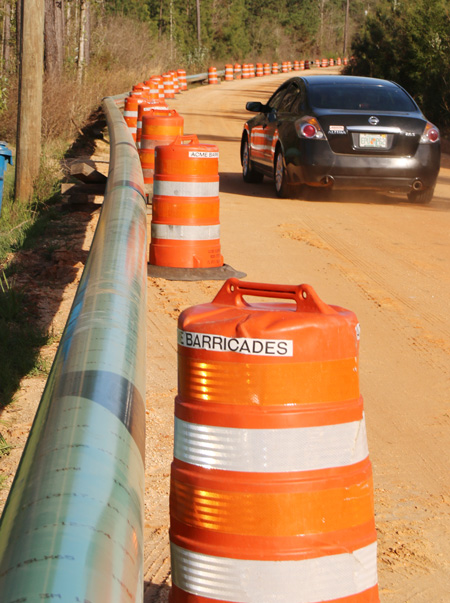 “The Highway 29 route would create traffic problems during the work,” Kennedy said.
“The Highway 29 route would create traffic problems during the work,” Kennedy said.
By comparison, burying the pipeline along Jefferson Avenue and Salters Lake Road would take about two weeks. Work would be performed during mostly daylight hours, and it would be the town’s decision oh if the contractors worked seven days or were required to stop work on the weekends.
But the idea is not sitting well with residents along the route.
“You don’t normally put a gas line in a residential area,” resident Roger Jenkins said. “You lower people’s property values. People don’t feel comfortable with a pipeline in their yard.”
“It looks like the minds here are already made up,” property owner Wayne Johnson told the council. “When it (a pipeline) comes down through a community like this, it makes a difference.”
Kennedy ask the council for a tentative approval to use right of way on Jefferson Street to allow the company to begin the process of obtaining the necessary permits. However, Mayor Henry Hawkins said the council could not vote at the meeting.
Councilman Lewis Gomez said the council and residents of the area need more time to make good decisions.
A public information meeting was set for Thursday, March 15 at 7 p.m. at the community center on West Highway 4.
The pipeline has already been delivered and is sitting above ground on Salters Lake Road, which is a county roadway. Barry said in the event the council does not approve the Jefferson Street Route, the pipeline will be removed from the side of Salters Lake Road.
Florida Public Utilities is constructing the pipeline along a 42-mile route through North Escambia from Century to Nine Mile Road. The pipeline continues south from Century along Highway 29 right of way from Century to Old Chemstrand Road. From there, an eight-inch line will follow Old Chemstrand Road to Ascend, while another eight-inch line will continue south on Highway 29 to Highway 95A in Cantonment to West Roberts Road to Pine Forest Road to West Nine Mile Road where the project will connect to an existing gas system.
Florida Public Utilities is a private company, not a government agency.
Pictured: Barry Kennedy of Florida Public Utilities (second from right) addresses the Century Town Council Thursday afternoon. Pictured inset: Gas pipeline above ground on Salter’s Lake Road. Pictured below: Highway 29 in Century Thursday afternoon. NorthEscambia.com photos, click to enlarge.


